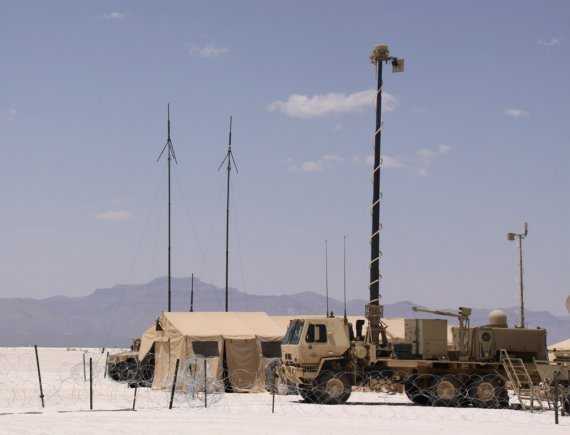NATO Special Operations Forces Headquarters (NSHQ) announced that it has selected Mutualink as its official interoperable communications platform. Using Mutualink’s ruggedized Valence series platform, NATO SOF coalition partners will be equipped with advanced anywhere, anytime, interoperable communications and information sharing capability.
This next generation capability enables warfighters and command and control elements to be securely linked with each other as and when needed across different communications systems and can share real time ISR, including files, maps, system views and full motion video (FMV) on the fly. For NATO SOF, quick reaction time and agile response capabilities are a must.
Often first on the ground in challenging operational environments, harnessing collaborative multi-national information and intelligence sharing and seamless communications capability is critical, and Mutualink delivers this capability.
Having been successfully deployed both in theater operations as well as with command and control, Mutualink was proven to be a highly effective and reliable system, bringing a new level of agile communications and information sharing in dynamic multi-partner operational environments.
Prior to deployment, Mutualink’s interoperable communications and information sharing solution was extensively tested and evaluated through sponsorship by the Department of Defense’s Combating Terrorism Technical Support Office’s Irregular Warfare Support Program (CTTSO/IWSP), specifically under a rapid technology integration program known as LOCHAN.
Mutualink proved superior in numerous key areas, including offering coalition partners true sovereign control and security over their national communication assets, quick set-up, simple operation, and scalable global reach.
According to NSHQ, Mutualink is a completely new paradigm that will enhance security, allow for standardization and improve flexibility and interoperability among all NATO Special Operations Forces (SOF) across the alliance.
Mutualink also supports NATO Secretary-General Anders Fogh Rasmussen’s Smart Defense framework by making the best use of legacy radio and other voice communications systems including legacy radio over IP solutions such as WAVE.
In addition to enabling SOF coalition partner interoperability, the system also enables linking with local and international governmental support agencies and other key entities using existing communications systems, providing full spectrum utility, ranging from humanitarian assistance, defense, infrastructure rebuilding and security stabilization efforts.
This capability significantly aligns with the current and foreseen nature of future NATO SOF mission requirements, where objectives are multidimensional, transnational and necessarily involve host nations.
Among its capabilities, Mutualink provides NATO SOF with an adaptive capability to deal with a variety of challenged communications environments.
With Mutualink fast set-up and utilization of whatever communications transport is available is achieved, helping establish critical communications among partners when they hit the ground.
Mutualink’s network agnostic nature enables NATO SOF to opportunistically utilize any IP enabled transport mechanism, including satellite, MANET, high capacity LOS radio, 3/4G wireless broadband, and terrestrial IP transport networks.
Using the secure end to end architecture of Mutualink, operators can link into a secure ad hoc virtual communications network enclave on the fly and communicate seamlessly with other partners as and when needed.
NATO SOF’s system establishes a new paradigm for multi-national cooperation, coordination and collaboration within a framework which preserves sovereign control of member nations and agencies.
The system’s unique sovereign control capability proved to be a key capability in successfully navigating the legacy challenges to inter-country communications sharing faced by coalition partners, and Mutualink is a first in achieving a true interoperable communications standard within NATO.
Mutualink’s innovative platform does not use any centralized server or switch infrastructure, creating a true peer-based environment.
With all intelligence distributed to the edge, each coalition partner retains absolute physical and logical control over its sovereign communications assets, eliminating the need for trusted controlling parties or other arrangements that create security issues and/or loss of sovereign control.
By enabling a federated environment with equal peers that can choose to participate in a communications session or not at their own discretion, coalition partners are empowered to collaborate without losing control over their communications or information.
According to Colin McWay, President of Mutualink, Inc., “NATO SOF’s selection of Mutualink as its interoperable communications platform of choice is very gratifying and we are honored to be entrusted with such an important mission.
Many of us having spent time with warfighters on the ground, we know firsthand how critical communications are to the safety of warfighters and ultimate mission success.
Our system has performed exceptionally well and furnished our warfighters and commanders with a tremendous capability that can assist them in achieving objectives with better situational awareness through quicker information exchange and better real time coordination.
If Mutualink can contribute to saving the lives of our brave men and women and those of our allies, we have achieved our purpose.”
In addition to NATO SOF, Mutualink has been engaged with a variety of defense related undertakings, including being invited to participate in the U.S. Army’s Network Integration Evaluation (NIE), which is a new Army technology evaluation and procurement initiative designed to speed the identification of available technologies to assist the Army and streamline procurement.
“We owe NATO SOF a debt of gratitude for recognizing Mutualink’s capabilities. It has been through their active leadership and support that Mutualink is now quickly being recognized as a capability that can serve US and coalition partner conventional forces as well. We are actively engaged in numerous venues and are looking forward to additional exciting developments in the near future,” said McWay.










